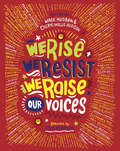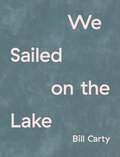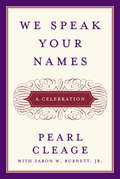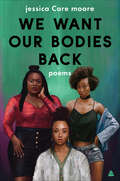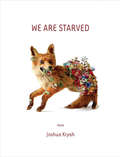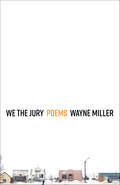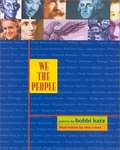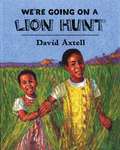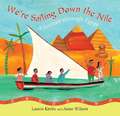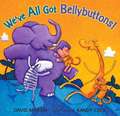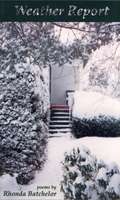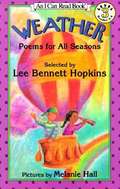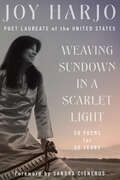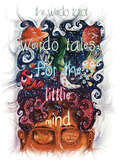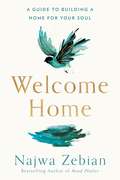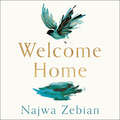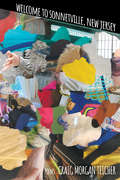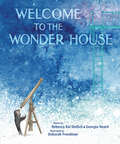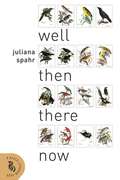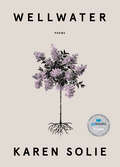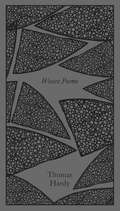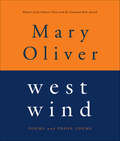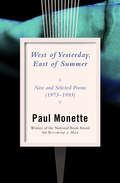- Table View
- List View
We Rise, We Resist, We Raise Our Voices
by Wade Hudson Cheryl Willis HudsonFifty of the foremost diverse children's authors and illustrators--including Jason Reynolds, Jacqueline Woodson, and Kwame Alexander--share answers to the question, "In this divisive world, what shall we tell our children?" in this beautiful, full-color keepsake collection, published in partnership with Just Us Books.What do we tell our children when the world seems bleak, and prejudice and racism run rampant? With 96 lavishly designed pages of original art and prose, fifty diverse creators lend voice to young activists.Featuring poems, letters, personal essays, art, and other works from such industry leaders as Jacqueline Woodson (Brown Girl Dreaming), Jason Reynolds (All American Boys), Kwame Alexander (The Crossover), Andrea Pippins (I Love My Hair), Sharon Draper (Out of My Mind), Rita Williams-Garcia (One Crazy Summer), Ellen Oh (cofounder of We Need Diverse Books), and artists Ekua Holmes, Rafael Lopez, James Ransome, Javaka Steptoe, and more, this anthology empowers the nation's youth to listen, learn, and build a better tomorrow.
We Sailed on the Lake
by Bill CartyWe Sailed on the Lake, Bill Carty’s second collection of poetry, consists of lyrics of spiraling awareness. As a signal lamp, unused, mirrors the sky, these poems reflect approaching storms, near-misses, and the violence inherent in nature, country, and economy.The poems in We Sailed on the Lake are closely observed, finding unexpected affinities within urban and natural environments alike. As one poem states, “to cross the lake / you’ve got to make each step / pertain to the water,” and these poems explore relationality in many forms, moving from gentrifying cities to coastal beaches, from the sculptures of antiquity to YouTube searches, cataloging passing days “of which light is the measure.”Alternating longer, occasionally narrative poems with short lyrics, this collection plays with time and ideas of promise, from youth to parenthood, noting how the self negotiates the artifices, be they technological or of self-design, that infringe upon reality and experience."
We Speak Your Names: A Celebration
by Pearl Cleage Zaron W. Burnett Jr.For centuries, African American women have been remaking the world, giving testament to the power of hope, courage, and resilience. But it took the inspired generosity of Oprah Winfrey to honor fully the many gifts of sisterhood. For three amazing days-from May 13 to 15, 2005--a distinguished group of women was invited to celebrate the enduring achievements of twenty-five of their mentors and role models--and in the process pay tribute to the long, glorious tradition of African American accomplishment. The brilliant centerpiece of the weekend was the reading aloud of Pearl Cleage's poem "We Speak Your Names," written especially for the occasion and appearing here for the first time in this beautiful keepsake book. As deeply moving in print as it was during that weekend of love and praise, the poem names each of the women honored: Dr. Maya Angelou, Coretta Scott King, Diahann Carroll, Toni Morrison, Nikki Giovanni, Rosa Parks, Katherine Dunham, and other legends of the brightest magnitude. With heartfelt eloquence, Pearl Cleage (herself a luminary of the younger generation) celebrates her distinguished elders' strength, their magic, their sensuality, their loving kindness, their faith in themselves, and the priceless example of their lives. In her introduction, the poet shares: "My sisters, here, there, and everywhere, this poem is for you. Use it, adapt it, pass it on..." Destined to become a classic, We Speak Your Names is a treasure to keep forever and a precious, inspiring gift for the ones you love.
We Speak in Changing Languages: Indian Women Poets 1990-2007
by E. V. Ramakrishnan Anju MakhijaOne of the functions of an anthology is to bring together works of poets to a wider audience. Anthologies also identify changing trends and indicate shirts in sensibility. The poets assembled here do not belong to a single trend or a common sensibility but they do share concerns and attitudes that justify their inclusion in a single volume. An anthology is a place where poems and poets speak to one another and in the process discover new configurations of metaphors and meanings. That these poets cannot be reduced to any single trait or theme makes this volume all the more a document of contemporary creative expression.
We Want Our Bodies Back: Poems
by Jessica Moore“moore provides a blueprint for how to veer outside of fixed expectations and still remain unflinching in her love for herself.” — The Mantle“We Want Our Bodies Back is a lyric encyclopedia, a psalm book, a conflagration of fire and fierce black joy. And jessica Care moore is the 21st Century poet warrior America desperately needs.” — Tracy K. Smith, U.S. Poet Laureate“Our plump, perfect, shea-buttered bodies. Our sun-scarred sinewy selves. Our stout tree-trunks, our walls. Our muscled forearms, our thick thighs, our phenomenal asses. Our weary hands. Forever, black women have shouldered the weight of the same world that denies their power and sway. The inimitable jessica Care moore—who has spent her life singing the most forceful notes of our soundtrack—is calling an end to that now. If We Want Our Bodies Back empowers you, it was meant to. If this book frightens you, it should.” — Patricia Smith, poet, playwright, author of Incendiary Art“jessica Care moore is my hero. Powerful, beautiful, excellent and unapologetically Black. She is who I want to be when I grow up. Her writing allows us to be seen for who we truly are.” — Talib Kweli, rapper, entrepreneur, and activist"There are many times that jessica Care moore's work has made me spend hours figuring out how much of her work would be socially acceptable to steal. I really wish she had put this out while I was writing my last album." — Boots Riley, director, emcee, Sorry to Bother You “Imbued with heartache, anger, celebration, and rejuvenation, the poems in We Want Our Bodies Back reflect the sui generis funktified flyness that jessica Care moore has exemplified as an independent artist, activist, publisher, and curator for nearly a quarter-century. Perhaps the premier resistance writer in America today, moore furnishes luminous poetic signposts for our treacherous journey through the gloomy landscapes of 21st century America.” — Tony Bolden, author of Afro-Blue: Improvisations in African American Poetry and Culture“We Want Our Bodies Back is a soaring resistance/upright bass/instrument of war. Here are poems that seek out my pain. A soldier allowed their childhood, a people returned to their Detroit. In a time of cobalt-imperialism, someone is still writing songs about God. Yes, revolution is exhausting, but we make countries; you and I.” — Tongo Eisen Martin, author, Heaven is All Goodbyes
We are Starved (Mountain West Poetry Series)
by Joshua Kryah"Joshua Kryah is redefining what it means to write spiritual poetry. This is not another book about longings for the spiritual; this is a book of offerings to the spiritual. These poems answer the plea of Yeats's spirits ('We are starved') and give them what they crave, depicting the particulars of human appetite and the way each 'peculiar and appalling hunger' unfolds. The scope of these poems is dizzying; they echo and glitter and sear as they, against all odds, give us a'world [that] is/suddener than any idea about the world.' We Are Starved is unabashed and unflinching, and it is deeply, exquisitely satisfying." -Mary Szybist, author of Granted Mountain West Poetry Series Published by the Center for Literary Publishing at Colorado State University
We the Jury: Poems
by Wayne MillerWinner of the 2022 Colorado Book Award for PoetryA boy asks his father what it means to die; a poet wonders whether we can truly know another’s thoughts; a man tries to understand how extreme violence and grace can occupy the same space. These are the questions Wayne Miller tackles in We the Jury: the hard ones, the impossible ones.From an academic dinner party disturbing in its crassness and disaffection to a family struggling to communicate gently the permanence of death, Miller situates his poems in dilemma. He faces moments of profound discomfort, grief, and even joy with a philosopher’s curiosity, a father’s compassion, and an overarching inquiry at the crossroads of ethics and art: what is the poet’s role in making sense of human behavior? A bomb crater–turned–lake “exploding with lilies,” a home lost during the late-aughts housing crash—these images and others, powerful and resonant, attempt to answer that question.Candid and vulnerable, Miller sits with us while we puzzle: we all wish we knew what to tell our children about death. But he also pushes past this and other uncertainties, vowing—and inviting us—to “expand our relationship / with Death,” and with every challenging, uncomfortable subject we meet. In the face of questions that seem impossible to answer, We the Jury offers not a shrug, but curiosity, transparency, a throwing of the arms wide.
We the People
by Bobbi KatzA collection of sixty-five original poems that depict people and events throughout the history of the United States.
We're Going on a Lion Hunt
by David AxtellThis charming version of a well-known chant takes place on the African savannaIn this beautifully illustrated rendition of a well-known children's chant, two sisters are looking not for a bear but for a lion--a lion that lives on the African savanna, where the girls go through swishy-swashy long grass, a splishy-splashy lake, and a Big Dark Cave. When they finally meet their lion, they have to run, run, run through it all again to get back home.Young readers will enjoy the playful language and beautiful paintings that reset a familiar story in a far-off part of the world.
We're Sailing Down The Nile: A Journey Through Egypt
by Laurie Krebs Anne WilsonAs the riverboat sails down the Nile River, remnants of Egypt's long history and aspects of its present culture are revealed on its banks.
We've All Got Bellybuttons!
by David MartinWe've got ears, and you do too. We can pull them. Can you? We've got hands for clapping, feet for kicking, and lots more too. But best of all--we've all got bellybuttons for tickle-tickle-tickling! In David Martin's rollicking romp, playfully illustrated by Randy Cecil, little ones can follow the actions of adorable animal babies and their families and discover all of the wonderful ways their bodies can move.
Weather Report
by Rhonda BatchelorLike the shifting and often turbulent skies of our own emotional meteorology, Rhonda Batchelor’s poems forecast the shifting patterns of a marriage from quiet moments of a graceful dawn to stormy seas of absence, from brilliant love-strewn sunshowers to dark moments of loss and bitter nights upon the shore. In three sections, "Backbone of the Moon", "Ghostly Dialogues" and "Still Breathing", Batchelor explores the fleeting forever trilogy of expectations, unions and releases that comprise the tidelike phases of a lover’s cycle. Dedicated to respected Canadian poet Charles Lillard, Batchelor’s late husband, this work keens to the notes of a personal lament but emerges triumphantly healed and ultimately blessed.
Weather: Poems for All Seasons (I Can Read! #Level 3)
by Lee Bennett HopkinsA collection of poems describing various weather conditions, by such authors as Christina G. Rossetti, Myra Cohn Livingston, and Aileen Fisher.
Weaving Sundown in a Scarlet Light: Fifty Poems For Fifty Years
by Joy HarjoA magnificent selection of fifty poems to celebrate three-term US Poet Laureate Joy Harjo’s fifty years as a poet. Over a long, influential career in poetry, Joy Harjo has been praised for her “warm, oracular voice” (John Freeman, Boston Globe) that speaks “from a deep and timeless source of compassion for all” (Craig Morgan Teicher, NPR). Her poems are musical, intimate, political, and wise, intertwining ancestral memory and tribal histories with resilience and love. In this gemlike volume, Harjo selects her best poems from across fifty years, beginning with her early discoveries of her own voice and ending with moving reflections on our contemporary moment. Generous notes on each poem offer insight into Harjo’s inimitable poetics as she takes inspiration from Navajo horse songs and jazz, reckons with home and loss, and listens to the natural messengers of the earth. As evidenced in this transcendent collection, Joy Harjo’s “poetry is light and elixir, the very best prescription for us in wounded times” (Sandra Cisneros, Millions).
Weirdo Tales for the Littlie Mind: A collection of stories that push the boundaries of normal
by The Weirdo Tarotdear reader, i must warn you that the following may entice you to a collection of stories that could leave you feeling curious and even a little odd. in these pages you will meet the part of me that is still a littlie, who often played alone finding solace in the sanctuary of imagination, yet struggled with the desire for a friend. don’t be fooled by the seemingly ordinary plot lines, there is more to these stories than meets the eye. within these pages you will find contentious topics that challenge societal norms, or stories that encourage children to think critically and form their own opinions, all in the hope to provide a neo-pedagogy-of-mutual-child-adult-parenting-experience. while these stories are perfect for littlies who may be eager to explore the weird world of the self, this children’s book is for all. and while the tales may seem strange, they are full of magic, dreamy adventures of self-discovery and journeys of growth, hope and renewal. you’ll learn the joys of decluttering the mind from dull forgettable thoughts. you’ll witness the magic of watching something grow and thrive. you may learn the lesson that true comfort can come in the simplest of forms. the endless, arduous journey to search for true friendship is matched by the raw emotional struggles of our weird and wondrous mind. so if you are brave enough to venture into the world of the weirdo tarot, i invite you to turn the pages and explore the mysterious and peculiar, weirdo tales for the littlie mind. yours weirdly, the weirdo tarot (be weird it’s normal)
Welcome Home: A Guide to Building a Home For Your Soul
by Najwa ZebianFrom the celebrated poet, speaker, and educator comes a powerful blueprint for healing by building a home within yourself.In her debut book of inspiration, poet Najwa Zebian shares her revolutionary concept of home - the place of safety where you can embrace your vulnerability and discover your self-worth. It's the place where your soul feels like it belongs, where you are loved for who you are. Building your home inside yourself - and never experiencing inner homelessness again - begins here. In Welcome Home, Zebian shares her story for the first time, powerfully weaving memoir, poetry and deeply resonant teachings into her storytelling, from leaving Lebanon at sixteen, to coming of age as a young Muslim woman in Canada, to building a new identity for herself as she learned to speak her truth. After the profound alienations she experienced, she learned to build a stable foundation inside herself, an identity independent of cultural expectations and the influence of others. With practical tools and prompts for self-understanding, she shows you how to build each room in your house, which form a firm basis for your self-worth, sense of belonging and happiness.Welcome Home provides the life-changing tools for building that inner space of healing and solace.
Welcome Home: A Guide to Building a Home For Your Soul
by Najwa ZebianFrom the celebrated poet, speaker, and educator comes a powerful blueprint for healing by building a home within yourself.In her debut audiobook of inspiration, poet Najwa Zebian shares her revolutionary concept of home - the place of safety where you can embrace your vulnerability and discover your self-worth. It's the place where your soul feels like it belongs, where you are loved for who you are. Building your home inside yourself - and never experiencing inner homelessness again - begins here. In Welcome Home, Zebian shares her story for the first time, powerfully weaving memoir, poetry and deeply resonant teachings into her storytelling, from leaving Lebanon at sixteen, to coming of age as a young Muslim woman in Canada, to building a new identity for herself as she learned to speak her truth. After the profound alienations she experienced, she learned to build a stable foundation inside herself, an identity independent of cultural expectations and the influence of others. With practical tools and prompts for self-understanding, she shows you how to build each room in your house, which form a firm basis for your self-worth, sense of belonging and happiness.Welcome Home provides the life-changing tools for building that inner space of healing and solace.(P) 2021 Penguin Random House Audio
Welcome to Sonnetville, New Jersey (American Continuum Series #184)
by Craig Morgan TeicherLenore Marshall Poetry Prize-winning poet and nationally recognized literary critic Craig Morgan Teicher’s Welcome to Sonnetville, New Jersey is a poetry collection about entering middle age, raising a young family, sustaining a marriage, and taking care of a severely disabled child. Built around two sequences of sonnets, and interrupted by two sets of lyric poems, a set of prose poems, and a long poem about death, the book narrates a family’s move to the suburbs and their coming to terms with the ghosts of the past and with hard-to-hold hopes for the future.
Welcome to the Wonder House
by Georgia Heard Rebecca Kai DotlichThis collection of poems, creatively presented in the format of an allegorical house, will engage anyone who has ever wondered &“why?&” as it shows young readers that wonder is everywhere—in yourself and in the world around you.Welcome to the Wonder House, a place to explore the cornerstone of every great thinker—a sense of wonder. This Wonder House has many rooms—one for nature, one for quiet, and one for mystery, among others. Each room is filled with poems and objects covering a wide variety of STEAM topics, including geology, paleontology, physics, astronomy, creative writing, and drawing, that will inspire curiosity in young readers.This enchanting book written by award-winning poets Rebecca Kai Dotlich and Georgia Heard both sparks wonder and shows readers how to kindle it in themselves.
Well Then There Now
by Juliana SpahrAccretion, articulation, exploration, transformation, naming, sentiment, private and public property these are just a few of Juliana Spahr's interests. In this, her third collection of poetry, we find her performing her characteristic magic, turning these theoretical concerns into a poetic odyssey. From her first poem, written in Honolulu, Hawaii, to the last, written in Berkeley, California, about her childhood in Appalachia, Spahr takes us on a wild patchwork journey backwards and forwards in time and space, tracking change in ecology, society, economies, herself. Through a collage of ''found language'' a deep curiosity about place, and a restless intelligence, Spahr demonstrates the vibrant possibilities of an investigatory poetics. This verse is more inclusive than exclusive; consistently Spahr includes grape varietals, the shrinking of public beachfront in Hawaii, endangered plant, fish, and wildlife species, the melting of the polar ice caps, and comparative poverty rates in her eclectic repertoire. She also knows how to sing in the oldest tradition of poetry of loss, and her lament for nature is the most keen.
Wellwater: Poems
by Karen SolieThe poems in Wellwater, Karen Solie’s sixth collection, explore the intersection of cultural, economic, and personal ideas of “value,” addressing housing, economic and environmental crisis, and aging and its incumbent losses. In an era of accelerating inequality, places many of us thought of as home have become unaffordable. In “Basement Suite,” the faux-utopian economy of Airbnb suggests people with property “share” it with us and, presumably, we should be grateful. In “Parables of the Rat” the speaker feels affinity with scavengers while also wanting the rats gone. Having grown up in Saskatchewan on a small family farm, Solie sees the economic and environmental crises as inseparable. Climate change has made small farming increasingly untenable, allowing overbearing corporate control of food production. But hope, Solie argues, is as necessary to addressing the crises of our time as bearing witness, in poems that celebrate wonder and persistence in the non-human world. Tamarack forests in Newfoundland that grow inches over hundreds of years, the suddenly thriving pronghorn antelope, or a new, unidentified and ineradicable climbing vine, all hint at renewal, and a way to move forward.
Wessex Poems and Other Verses: And Other Verses (Penguin Clothbound Poetry)
by Thomas HardyWessex Poems was Hardy's first collection of poetry, published after he had turned away from novel-writing, disillusioned by the savage reception Jude the Obscure had received. The publication of Wessex Poems marked the start of an extraordinary new phase in Hardy's writing career, as he was to spent the rest of his life, some thirty years, writing and publishing poetry exclusively. Here are entertaining Dorset ballads, verses set during the Napoleonic Wars, and personal poems reflecting on Hardy's life and loves. Composed throughout Hardy's life and informed by his affection for his beloved Wessex, their publication heralded the arrival of a major new poetic voice.
West Wind: Poems and Prose Poems
by Mary OliverA collection from the Pulitzer Prize–winner whose poems have been praised “as genuine, moving, and implausible as the first caressing breeze of spring” (The New York Times).In this stunning collection of forty poems—nineteen previously unpublished—she writes of nature and love, of the way they transform over time. And the way they remain constant. And what did you think love would be like? A summer day? The brambles in their places, and the long stretches of mud? Flowers in every field, in every garden, with their soft beaks and their pastel shoulders? On one street after another, the litter ticks in the gutter. In one room after another, the lovers meet, quarrel, sicken, break apart, cry out. One or two leap from windows. Most simply lean, exhausted, their thin arms on the sill. They have done all they could. The golden eagle, that lives not far from here, has perhaps a thousand tiny feathers flowing from the back of its head, each one shaped like an infinitely small but perfect spear.“From the chaos of the world, her poems distill what it means to be human and what is worthwhile about life.” —Library Journal“Her poems do indeed make us ‘shiver with praise.’” —Booklist
West of Yesterday, East of Summer: New and Selected Poems (1973–1993)
by Paul MonetteA poetry collection spanning the career of award-winning writer Paul Monette<P> Paul Monette got his start writing poetry, and it was to this form that he returned following the death of his partner Roger Horwitz from AIDS-related complications. This stunning collection includes Monette's early work as well as the beautiful and wrenching poems borne out of this immense loss. Written with characteristic wit, these poems deftly traverse humor, rage, love, and sorrow.<P> West of Yesterday, East of Summer captures the range of an important writer.<P> This ebook features an illustrated biography of Paul Monette including rare images and never-before-seen documents from the Paul Monette papers of the UCLA Library Special Collections.
